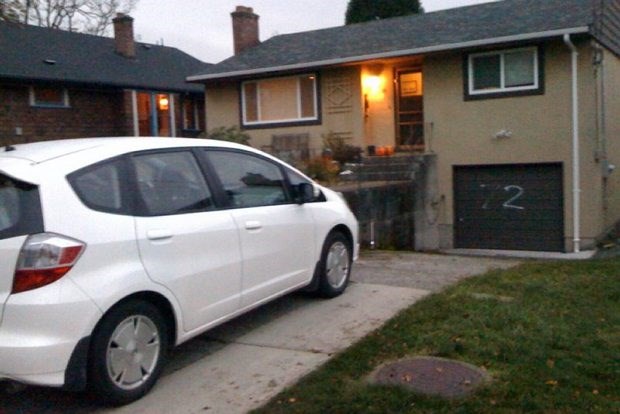Victoria police are hunting a vandal or vandals who will be prosecuted to the "fullest extent of the law" after they defaced Mayor Dean Fortin's house and car early Thursday morning.
Calling the incident "cowardly," police Chief Jamie Graham said the perpetrators could face criminal charges of intimidation and mischief for breaking a car window, spray-painting graffiti on the Fortins' car and house and sending a threatening email.
The vandals identified themselves in an email sent to CBC Vancouver as "PG72." They said they were fighting back against the mayor over the treatment of homeless people and a recent shuffle of shelter beds and transitional housing that they say has left people out in the cold.
"The city has declared war on the poor, and we're fighting back," said the email. The group goes on to brag: "Fatcat Fortin was also left with a shattered [car] window and shattered middle-class peace."
The vandalism was roundly criticized by social service activists, community workers and advocates for the homeless.
"Unprovoked attacks in the middle of the night on public officials, their families and children have no place in civilized society," said Victoria Labour Council president Mike Eso.
Rev. Al Tysick, who runs the Our Place drop-in
shelter on Pandora Avenue, said the group acted on
misinformation that could damage "the work of everyone in the community working together to end homelessness."
Debbie Thompson, executive director of the Greater Victoria Coalition to End Homelessness a partnership of about 40 non-profit groups, businesses, churches and various levels of government said the violent action is "not representative of all people who are experiencing poverty and homelessness."
And the Victoria Cool-Aid Society, which provides health and social services to street people, defended Fortin, saying he's done more than any other municipal politician to provide housing and shelter to people in the community.
The only group to not condemn the vandals' actions was the Committee to End Homelessness, a group of activists and former homeless people that has a similar name to, but no affiliation with, the larger Greater Victoria Coalition to End Homelessness. In a statement, Phil Lyons said the group had nothing to do with the attacks, and went on to say: "We can see the reasons for these attacks but do not favour them. When there are attacks on the homeless like those by city council forcing desperate people off Pandora Green, this is an expected reaction."
Fortin was alerted to the vandalism at his Victor Street home in the Oaklands neighbourhood after CBC received the email from PG72. "I came out and thought, 'oh my God,' " Fortin said, adding the incident must have happened overnight while he, his wife and two daughters, ages 3 and 9, were sleeping inside.
"I am disappointed and saddened by the actions a few have taken against my home. Obviously it has an impact on my family and my two young girls," he said.
"This incident does nothing to help us solve homelessness in our community."
The vandals smashed a rear passenger window in the Fortins' white Honda, which was parked in the driveway. The letters ACAB, which the vandals' email said meant "all cops are bastards," were spray-painted on the car door.
The number 72 was spray-painted on the Fortins' garage door, which the email said was "for the 72 shelter beds cut in Victoria this week" a number that various organizations disputed Thursday.
The letters PG were also spray-painted on the side of the house, a reference to Pandora Green the greenspace on Pandora Avenue where street people had been congregating until the city's amended streets and traffic bylaw that prohibits camping on boulevards came into effect in October.
The spot was a focal point for drug use and dealing, homeless camping and prostitution in the past two years, since Our Place opened and in the wake of a 2008 B.C. Supreme Court decision striking down the city's prohibition on camping in parks.
